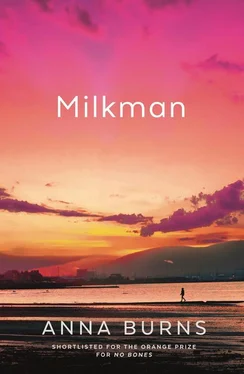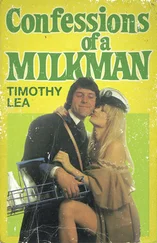Anna Burns - Milkman
Здесь есть возможность читать онлайн «Anna Burns - Milkman» весь текст электронной книги совершенно бесплатно (целиком полную версию без сокращений). В некоторых случаях можно слушать аудио, скачать через торрент в формате fb2 и присутствует краткое содержание. Город: London, Год выпуска: 2018, ISBN: 2018, Издательство: Faber & Faber, Жанр: Современная проза, на английском языке. Описание произведения, (предисловие) а так же отзывы посетителей доступны на портале библиотеки ЛибКат.
- Название:Milkman
- Автор:
- Издательство:Faber & Faber
- Жанр:
- Год:2018
- Город:London
- ISBN:978–0–571–33876–4
- Рейтинг книги:3 / 5. Голосов: 3
-
Избранное:Добавить в избранное
- Отзывы:
-
Ваша оценка:
- 60
- 1
- 2
- 3
- 4
- 5
Milkman: краткое содержание, описание и аннотация
Предлагаем к чтению аннотацию, описание, краткое содержание или предисловие (зависит от того, что написал сам автор книги «Milkman»). Если вы не нашли необходимую информацию о книге — напишите в комментариях, мы постараемся отыскать её.
–
In this unnamed city, to be interesting is dangerous. Middle sister, our protagonist, is busy attempting to keep her mother from discovering her maybe-boyfriend and to keep everyone in the dark about her encounter with Milkman. But when first brother-in-law sniffs out her struggle, and rumours start to swell, middle sister becomes 'interesting'. The last thing she ever wanted to be. To be interesting is to be noticed and to be noticed is dangerous.
Milkman is a tale of gossip and hearsay, silence and deliberate deafness. It is the story of inaction with enormous consequences.
Milkman — читать онлайн бесплатно полную книгу (весь текст) целиком
Ниже представлен текст книги, разбитый по страницам. Система сохранения места последней прочитанной страницы, позволяет с удобством читать онлайн бесплатно книгу «Milkman», без необходимости каждый раз заново искать на чём Вы остановились. Поставьте закладку, и сможете в любой момент перейти на страницу, на которой закончили чтение.
Интервал:
Закладка:
So shiny was bad, and ‘too sad’ was bad, and ‘too joyous’ was bad, which meant you had to go around not being anything; also not thinking, least not at top level, which was why everybody kept their private thoughts safe and sound in those recesses underneath. As for da and ma, da went too much ‘the long face’ way, and ma too forcibly the ‘onwards and upwards’ way, with da periodically breaking down and having to go to hospital, and with ma subsequently forgetting ‘onwards and upwards’ and getting angry at him for yet again abandoning her with us in this place. For years I didn’t know, along with the younger in my family, that da was going into hospital, also that it was a mental hospital. We thought, because we were told, that whenever he disappeared he was off to long hours of work, long days of work, lengthy weeks of work in some faraway town or country or, if not that, that he was seeing some specialist doctor far away because of the pains he was getting in his back. But it was mental hospitals, and it was mental breakdowns, which meant cover-up, which meant shame, which meant even more shame in his case because he was a man. Males and mental hospitals went together far less than females and mental hospitals went together. In a man’s case, this equalled a gender falling-down in pursuance of his duties, totalling a failure above all to keep face. Again, at first, I didn’t understand. Didn’t know either, that ma, under emotional pressure, under peer pressure, shame pressure, was presenting her take on da’s illness to the neighbours, who of course had their own take on it themselves. ‘Faraway work in faraway lands, our backsides,’ they’d say, and ma knew this, which was why she blamed da – even after he became no longer living – even more. Often it seemed she didn’t love him but instead she hated him. ‘Sad story!’ she’d flounce. ‘What sad story? No pain really. All in his head really. Nothing out there really.’ And she’d pretend, though wouldn’t be able, to shrug da off. I hated it when ma did this, when she’d speak ill like this, especially to us to whom she should not run down our father. But she’d continue because once started, she’d fixate on his fixating to the point where, primed and triggered and far, far too angry, she’d have to run the course because she couldn’t stop. I used to puzzle over the extent of this anger, of all of ma’s blaming and haranguing and complaining. It was only much later that I came to realise that this was a case of her not forgiving him for many things – maybe for all things – and not just for not cheering up.
That was what she did. She brought this unforgiveness into every tenuous connection, into such too, as the ten-minute area. Like da, according to ma, it also entertained no hope to brighten up. ‘Too stuck,’ she said, ‘too lingering, too brooding. There’s no rhyme or reason for it, daughter. It’s imaginary – that’s its provenance, meaning it has no provenance.’ ‘I see,’ I said, which of course, regarding the mystery and signature of the ten-minute area, I did not. And now here I was, walking through it, initially mindful of sky and of our teacher, of her words on light and dark and our automatic response of ‘Dark! We’ll have the dark please!’ As for the Nazi bomb, most of the wreckage had by this point been cleared. The ground was still bumpy, not yet flattened, with the site where the church had stood probably not to be turned into a carpark in the way other bombed places here usually ended as carparks. The historical and inexplicable desolation of this ten-minute area would put paid to any possible desire on the part of anybody to come and park their car here.
There were a few smaller bits of broken masonry still, and they were to be stepped over, skirted around, which was what I was doing as I made my way through and on towards my next landmark. Glancing up towards it, towards the graveyard, I noticed for the first time trees within it, which brought me back to the sky having earlier been green. But if green can be up there, I wondered, or sometimes up there, does not that mean the ground, also at times, can be blue? This had me glancing to the ground and this time I saw that there was something on it. Lying to the side amidst the uncleared rubble was a decapitated, still furry, matted-furry, little cat’s head. The face was turned to the ground, the ground here consisting of bombed-up concrete. My first impression was that of a child’s ball, some toy, a play-moneybag pretending to be a real moneybag, with animal-like ears and fur and whiskers. But it was a cat, the head of a cat, one that had been alive up until that explosion. Something had died then, I realised, in that bomb from long ago after all.
Cats are not adoring like dogs. They don’t care. They can never be relied upon to shore up a human ego. They go their way, do their thing, are not subservient and will never apologise. No one has ever come across a cat apologising and if a cat did, it would patently be obvious it was not being sincere. As for dead cats – as in the deliberate killing of cats, killing them as a matter of course – I have come across that many times. The days of my childhood was when I would come across it, during the time cats were vermin, subversive, witch-like, the left hand, bad luck, feminine – though no one ever came out and levelled the feminine except during drunkenness with the drunkenness – should violence then ensue towards some hapless female – later being blamed for the cause. Men and boys killed the cats, or at least in default of killing them, kicked them or catapulted them with stones on passing. It was one of those things that happened, so you didn’t mention the occasions when you happened to come across a dead cat. As for myself, I did not kill cats, did not want to be around either, the killing of them. So conditioned was I, however, by those times, by a learned revulsion, that I feared to come across one that was living even more than seeing one that was dead. I would have dreaded the contact, would have screamed myself silly to have touched one. Lots of cats then, years ago, dead. Dogs, on the other hand, were in abundance and absolutely they were okay. Dogs were sturdy, loyal, feudal, good for man’s account of himself and with a slavish need to be obedient to someone. Acceptable therefore. To be proud of. To be viewed as vicious, as protective and everybody had one but that didn’t save them either, because one night nearly all of them, bar two of them, got killed as well. They got killed once, the dead dogs, all at once, and this great canicide, as opposed to the casual, everyday felicide, also took place in my childhood, took place too, in a macabre, spectacular fashion when the soldiery from ‘over the water’ slit the district’s dogs’ throats in the middle of one night. They left the dead bodies in a giant heap, strategically placed at the top of one of the entries, those same entries where usually the milkcrates of ragged-up petrol bombs would be stacked for the next district riot that would take place at some point during that same day. Everybody knew it had been the soldiers, that it had been a statement by them to teach us, the natives, a lesson, to announce they could deal with our dogs, could overcome our dogs barking and snarling and warning renouncers of their presence. Our dogs though, had never been just about that.
It had been for the benefit of all of us that they should bark and snarl and be alarm dogs, not just for the benefit of the renouncers. By doing so, our dogs alerted everyone, particularly all boys and men – young men, older men, renouncers, non-renouncers – for males got it worse – to the presence of those soldiers, who’d arrive in saturated numbers in their armoured cars and vehicles from which they’d leap out and patrol with heightened suspicion all our streets around. Everyone appreciated the early warning system the dogs offered owing to the few moments’ leeway it afforded, because in that manner easier it was, usually, to get oneself out of their way. It wasn’t agreeable to go out your door otherwise, and to be stopped on the street and, outnumbered and at gunpoint, ordered to answer questions, to spread against a wall, to be searched against that wall – beside the entries, the tops of those entries – to stay put in that exact search position for as long as those soldiers thought appropriate; not agreeable either, to be smirked at by these grown men with their guns, should you – the wife, the sister, the mother, the daughter – come out your door to bear witness to what was being done to your son, your brother, your husband or your father. Especially was it not agreeable when it was made clear that your son or your brother or your husband or your father would stay put against that wall for as long as you remained there, being witness to what was going on. So do you continue? Do you stand strong? Do you bear witness, even if, in the process, you cause more suffering and prolonged humiliation for your son or your brother or your husband or your father? Or do you go away, back inside, abandoning your son or your brother or your husband or your father to these people? If not that, then it couldn’t possibly be agreeable to any woman coming out her door to have the drip-drip effect of sexual comments made to her, goaded by those lewdsters of the very bad remark. ‘Your boot,’ they’d say. ‘Your box,’ they’d say. ‘Your suitability for doxiness.’ Then, ‘What we’d do to your face if …’ or something like that, and again with their guns and barely contained, often uncontained, emotions, spilling out over the brim. Naturally – or maybe not naturally but understandably – it wouldn’t be untoward for the girl or the woman on the receiving end of this language to think, if a renouncer-sniper from some upstairs window takes your head off now with a rifle-shot, soldier, not only would your passing not chagrin me, I think it would be a pleasant, mentally relieving, charming, karmic thing. So this was hatred. It was great hatred, the great Seventies hatred. One must set aside too, the misleading and cumbersome inadequacy of the political problems, and all rationalisations and choice conclusions about the political problems, in order appropriately to gauge the weight of this hatred. As someone, a very ordinary person from ‘over the road’, once said on TV, succinctly too, because he wanted to kill every person of my religion in my area – which meant everybody in my area – in retaliation for some renouncer-of-the-state from my area walking over the road and bombing to death many people of his religion in his area, ‘It’s amazing the feelings that are in you.’ And he was right. It is amazing, no matter it may not be yourself who pulls the trigger in the end.
Читать дальшеИнтервал:
Закладка:
Похожие книги на «Milkman»
Представляем Вашему вниманию похожие книги на «Milkman» списком для выбора. Мы отобрали схожую по названию и смыслу литературу в надежде предоставить читателям больше вариантов отыскать новые, интересные, ещё непрочитанные произведения.
Обсуждение, отзывы о книге «Milkman» и просто собственные мнения читателей. Оставьте ваши комментарии, напишите, что Вы думаете о произведении, его смысле или главных героях. Укажите что конкретно понравилось, а что нет, и почему Вы так считаете.











